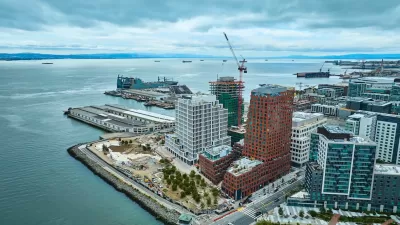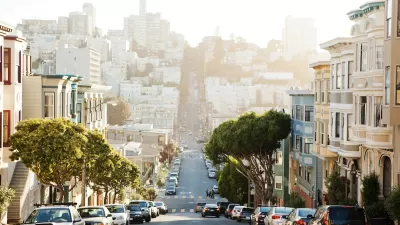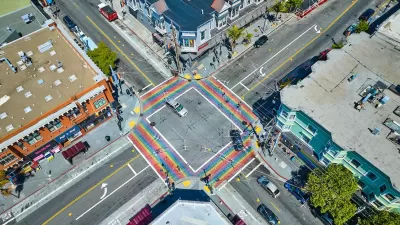In this Climate Watch blog and accompanying "Miles To Go" radio report, the reporter observes how powerful parking rated as a factor in determining whether to drive, walk, or take transit, and the public policies that affect the quantity of parking.
Krissy Clark, the L.A. Bureau Chief for The California Report at KQED, confesses that her "transportation habits have very little to do with how environmentally conscious I am as a person, and have a lot to do with parking spots." She contrasts her lifestyle when she lived in San Francisco to her current travel behavior and recognizes that the abundance of free, convenient parking spots caused her to abandon her "bike, my feet, the bus, BART and the transbay ferries" that formed the core of her trips as a SF resident.
The one exception: "Parking costs too much at LAX, so I take the city shuttle."
"It turns out my different lives in L.A. and San Francisco, and my different parking options, are no accident. They're based on different approaches the places take to parking. According to a RAND study from 2007, in San Francisco there is "a deliberate effort by planners to reduce private vehicle use" which "limits the number of parking spaces that may be included in a new development." In contrast, across most of L.A., developers are required to provide a certain number of parking spaces, "ensuring that parking will remain cheap and abundant and reinforcing auto-dependency."
Clark offers a slightly different angle on the same issue on her accompanying Miles To Go radio report, The Carrot and the Stick.
Thanks to California League of Conservation Voters
FULL STORY: Blame My Driving Habits on that Parking Spot

Planetizen Federal Action Tracker
A weekly monitor of how Trump’s orders and actions are impacting planners and planning in America.

Maui's Vacation Rental Debate Turns Ugly
Verbal attacks, misinformation campaigns and fistfights plague a high-stakes debate to convert thousands of vacation rentals into long-term housing.

Restaurant Patios Were a Pandemic Win — Why Were They so Hard to Keep?
Social distancing requirements and changes in travel patterns prompted cities to pilot new uses for street and sidewalk space. Then it got complicated.

In California Battle of Housing vs. Environment, Housing Just Won
A new state law significantly limits the power of CEQA, an environmental review law that served as a powerful tool for blocking new development.

Boulder Eliminates Parking Minimums Citywide
Officials estimate the cost of building a single underground parking space at up to $100,000.

Orange County, Florida Adopts Largest US “Sprawl Repair” Code
The ‘Orange Code’ seeks to rectify decades of sprawl-inducing, car-oriented development.
Urban Design for Planners 1: Software Tools
This six-course series explores essential urban design concepts using open source software and equips planners with the tools they need to participate fully in the urban design process.
Planning for Universal Design
Learn the tools for implementing Universal Design in planning regulations.
Heyer Gruel & Associates PA
JM Goldson LLC
Custer County Colorado
City of Camden Redevelopment Agency
City of Astoria
Transportation Research & Education Center (TREC) at Portland State University
Jefferson Parish Government
Camden Redevelopment Agency
City of Claremont





























